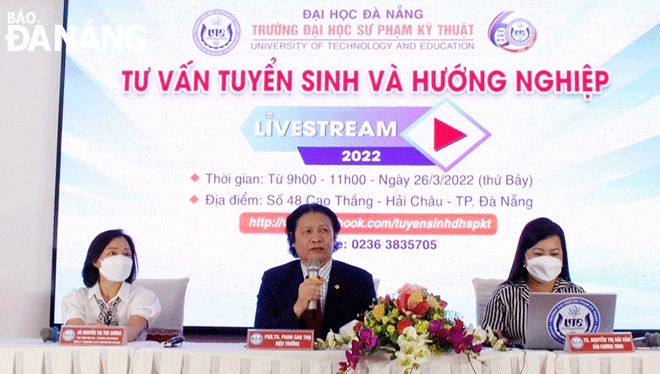Da Nang universities develop new training programme adapting to Industry 4.0
In their efforts to adapt to the Fourth Industrial Revolution or Industry 4.0 and help their students meet recruitment requirements of future employers, some universities in Da Nang have developed new trainning programmes or made adjustments to them in their 2022 enrollment season.
 |
| Da Nang universities are promoting enrollment counseling in 2022 in an attempt to recruit potential students for their schools. IN THE PHOTO: The University of Technical Education conducting an online enrollment counseling. Photo: NGOC HA |
This year, the University of Economics introduced new course on Financial Technology (Fintech).
Assoc. Prof. Dr. Doan Ngoc Phi Anh, the Head of the School's Training Division, said that Fintech, a portmanteau of "financial technology," is the application of new technological advancements to products and services in the financial industry. The term encompasses a rapidly growing industry that serves the interests of both consumers and businesses in multiple ways. From mobile banking and insurance to cryptocurrency and investment apps, fintech has a seemingly endless array of applications. Fintech has showed its role of an innovation-driving area, which can bring outstanding changes to the traditional financial market. In consumer and commercial lending, for example, the emergence of online platforms allows individuals and businesses to lend and borrow between each other. Lending innovation also manifests itself in alternative credit models, use of non-traditional data sources and powerful data analytics to price risks, rapid customer-centric lending processes, and lower operating costs. In recent years, the payments industry has also experienced a high level of disruption with the surge of new technology-driven payments processes, new digital applications that facilitate easier payments, alternative processing networks and the increased use of electronic devices to transfer money between accounts. In which, digital lending and e-wallet payment, application of big data analytics in practical use of the trust-based crowdfunding campaign marketing framework, and digital asset management have been of particular interest to financial institutions in recent years due to their rapid development.
Fintech is still quite new in Viet Nam and the fintech regulatory framework in the country is still in the early stage of development. The number of fintech companies in Viet Nam has increased from 44 in 2017 to 131 in 2020. Despite the rapid development of fintech companies, when compared to other countries in South-East Asia such as Singapore, Thailand, Malaysia, fintech companies in Vietnam still face limitations both in their number, scope of operation and human resources. The serious shortage of high-quality human resources for the fintech sector is a big challenge for Viet Nam.
The survey results released by Vietnam bankers Academy show that high-skilled workers account for over 90% of the banking and financial sector employees but they have limited technological knowledge and skills required for their jobs. In contrast, IT engineers are lacking in-depth knowledge of the banking and financial sector.
Da Nang is moving to develop itself as a regional financial hub, and Fintech is identifed as the most important factor for the development of the future financial center. It is considered major push and pull factors that facilitate the formation and development of Fintech companies, and the Fintech ecosystem in general, in Da Nang.
“The school opens its new training programme on Fintech in an effort to keep up with growing demand of high-quality human resources for this field,” said Assoc. Prof. Dr. Doan Ngoc Phi Anh.
Vietnam - Korea University of Information and Communication Technology (VKU) has also opened new courses adapting to Industry 4.0. Apart from training IT engineers, the school is offering bachelor degree programs in information technology and computer engineering, digital arts and communication. In addition, the school is introducing the training program on artificial intelligence for a bachelor's and an engineer's degree, and the IT Networking and Security Program for an engineer's degree.
In its 2022 enrollment season, VKU will enroll students in new courses on IT project management, digital financial management, and digital marketing.
Although the University of Technical Education does not open any new courses but the school has already made adjustments to its training in an attempt to meet social requirements. The focus has been on teaching with digital technologies and latest equipment as well as improving digital skills and teaching methods for the school’s lecturers in order to drive digital transformation in the teaching-learning process.
In addition, the school has developed more specialized training in food science to promote the use of biotechnology in developing macrobiotic foods and healthy food products. Training also aims to increase the use of chemicals to synthesize new substances, create smart materials, advanced materials, nanomaterials for the sake of the production and life.
Assoc. Prof. Dr. Nguyen Hong Hai, the Vice Rector of the University of Science and Technology said that the opening of new training programs offers more choices to students and help them meet recruitment requirements of future employers in the context of digital transformation. The school’s training courses which can keep up with the labour market trends include smart cities engineering and management, artificial intelligence in the construction industry, and biomedical technology.
Reporting by NGOC HA – translating by H.L